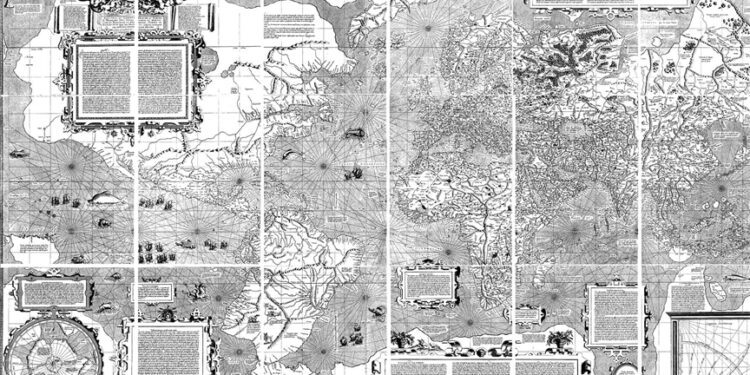- Correcting the world map is not ‘just a geography issue or just a map,’ but ‘a narrative issue about pride and identity,’ says Moky Makura
- African-led Correct the Map campaign, backed by the African Union, calls for adoption of Equal Earth map in schools, media, and institutions
ISTANBUL
For generations, schools, media outlets and decision-makers have relied on a familiar world map. It has become a global standard, seen everywhere from classroom posters to government buildings. But behind its widespread use lies a major flaw: the Mercator projection presents a distorted view of the world.
Now, a growing initiative led by African organizations Africa No Filter and Speak Up Africa, with support from the African Union (AU), is pushing for change. The Correct the Map campaign urges a shift away from the outdated projection, which artificially inflates the size of some regions while minimizing others, particularly Africa.
The campaign calls for global adoption of the Equal Earth projection, introduced in 2018, which preserves proportional continent sizes and presents a fairer, more visually balanced view of the planet.
“A map decides what to highlight, what to leave out, where to place the center, and how big or small places appear,” Moky Makura, the executive director of Africa No Filter, told Anadolu.
“Those choices create a narrative about importance, connection, and power. Mercator map shrinks Africa’s size, which downplays its importance.”
Mercator projection and other ways to see the world
It has never been easy to turn the globe into a map – a task similar to attempting to cover a ball with a piece of paper without causing it to wrinkle.
Flemish cartographer Gerardus Mercator’s 1569 projection solved a key problem for sailors: keeping compass bearings as straight lines.
But the cost was scale. Countries near the poles appear disproportionately large, while equatorial nations are shrunk.

Greenland, for instance, looks almost the same size as Africa, even though Africa is, in reality, 14 times larger.
Makura said the projection, which was widely adopted during European colonial expansion as it emphasized Europe and sailing routes, also reinforces colonial-era narratives, portraying Africa as small, peripheral and less significant in the global order.
“It’s not just a geography issue or just a map,” she said. “It’s a narrative issue about pride and identity.”
The Equal Earth projection, Makura explained, offers an alternative that corrects distortions while keeping continents in familiar, recognizable shapes, unlike previous projections.
The campaign’s petition urges schools, media outlets, international institutions and platforms such as the BBC and the UN to adopt it.
Makura said that to change how Africa is perceived, the correct map needs to be part of everyday life.
“But for that to happen, systems must change,” she added.
‘Africa is reclaiming its power’
Governments, institutions and education ministries must formally adopt maps like Equal Earth in curricula, public buildings, and official documents, Makura said.
Tech companies, publishers, and travel platforms should also replace outdated projections in their products.
She stressed the need to involve educators, media, artists and civil society to raise awareness, noting that once people recognize the distortion, they are motivated to fix it.
“Ultimately, changing the map is about changing mindsets,” she said.
Last month, the campaign gained the backing of the African Union.
Makura called the endorsement “a powerful signal that correcting the map is a continental priority,” applauding the fact that the campaign is African-led.
“It’s time to end the biggest lie in geography,” she said. “Maps are instruments of power. Africa is reclaiming its power.”
Seeing Africa minimized on maps, she warned, can subconsciously make the continent seem less important, less powerful and less worthy of attention – shaping everything from where aid is directed to how policies and investments are decided.
“Stereotypical narratives impact investments into the continent,” she noted.
A June 2025 report by Africa No Filter and the University of Bath found that negative stereotypes make people in the UK and US less likely to buy African products. “If Africa looks small and peripheral, it’s easier to overlook its billion people, its creativity, its influence, its opportunity,” Makura said, adding the continent is often viewed as “a place to fix,” rather than as one to partner with or learn from.
She added that Africa’s image is often dominated by narratives of poverty, disease, corruption and conflict, overshadowing its dynamism and contributions in fields like fintech, health care and education.
For example, the world’s oldest continuously operating university, Al-Qarawiyyin, was founded in Africa – Morocco – in 859 by Fatima al-Fihri, a migrant woman from Tunisia. “How many people know that?” Makura asked.
“Africa is not a broken continent,” she said. “Africans have agency.”






